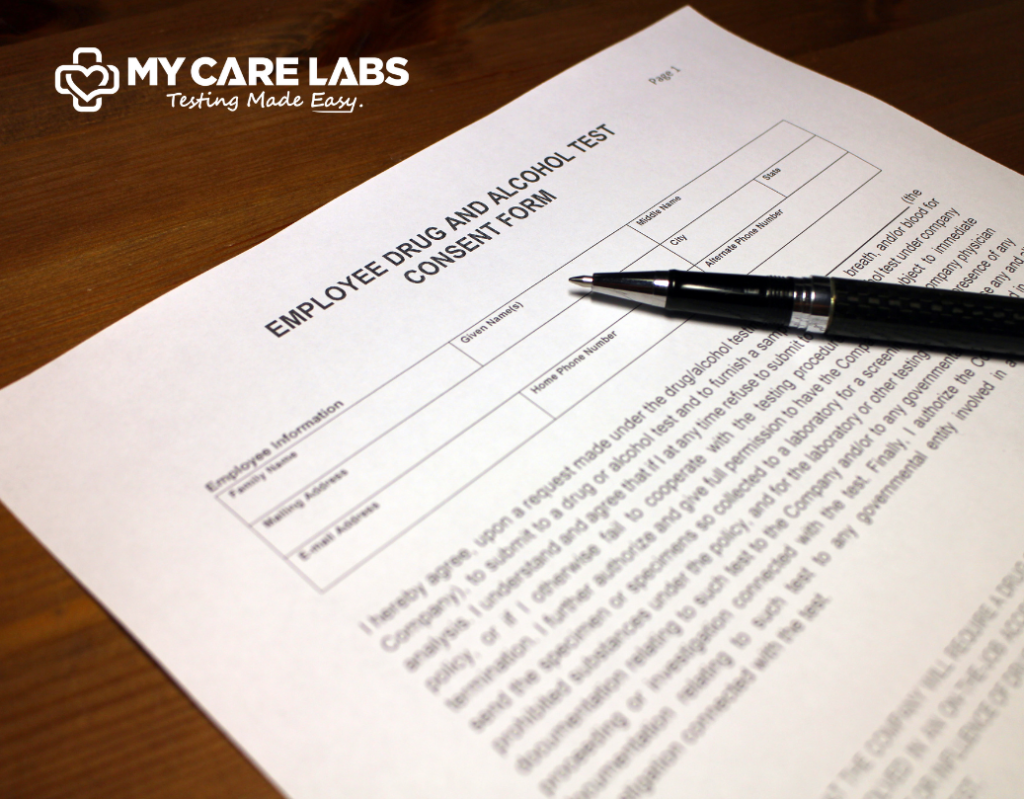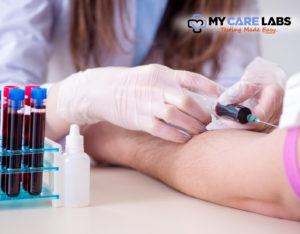Pre-Employment Drug Screening is a critical process aimed at assessing potential employees for the presence of drugs or alcohol in their system.
Through this process, employers can safeguard their workplace against the detrimental effects of substance abuse, including accidents, injuries, and reduced productivity.
Our in-detail guide aims to provide a thorough understanding of Pre-Employment Drug Screening, its significance in today’s workforce landscape, and how My Care Lab can assist employers in implementing effective screening programs.
By offering insights into the purpose and process of pre-employment drug screening, we aim to equip employers with the knowledge and resources necessary to prioritize workplace safety and compliance.
With pre-employment drug screening, employers can confidently navigate the complexities of hiring while mitigating potential risks associated with substance abuse in the workplace.
Let us guide you through the process of Pre-Employment Drug Screening and help you create a safer and more secure work environment.
Understanding Pre-Employment Drug Screening:
Definition and Background:
- Pre-employment drug screening refers to the process of testing job applicants for the presence of drugs or alcohol in their system before they are hired.
- This screening is typically conducted as part of the hiring process to assess the applicant’s suitability for employment based on their substance use history.
- The practice of pre-employment drug screening has become increasingly common across various industries as employers recognize the importance of maintaining a drug-free workplace.
Importance for Employers and Employees:
For Employers:
- Pre-employment drug screening helps employers mitigate the risks associated with hiring individuals who may pose safety hazards or liabilities due to substance abuse.
- It helps protect the company’s reputation and minimize the potential for workplace accidents, injuries, and legal issues.
- Employers can also benefit from reduced absenteeism, increased productivity, and improved employee morale in a drug-free work environment.
Legal Implications and Regulations:
- Pre-employment drug screening is subject to various legal regulations at both the federal and state levels.
- The Drug-Free Workplace Act of 1988 requires certain federal contractors and grantees to maintain drug-free workplaces by implementing drug testing programs.
- Additionally, many states have their own laws and regulations governing pre employment drug testing, including requirements for consent, notification, and confidentiality.
- Employers must ensure compliance with these regulations to avoid potential legal challenges and penalties.
Role in Promoting Workplace Safety and Productivity:
- Drug testing plays a crucial role in promoting workplace safety by identifying individuals who may be under the influence of drugs or alcohol while on the job.
- By screening out applicants with a history of substance abuse, employers can reduce the likelihood of workplace accidents, injuries, and errors.
- A drug-free work environment fosters greater productivity, as employees are less likely to be impaired by drugs or alcohol and can perform their duties effectively and efficiently.
Moreover, drug testing sends a clear message to employees that substance abuse is not tolerated in the workplace, thereby discouraging drug use and promoting a culture of accountability and responsibility.
Benefits of Pre-Employment Drug Screening:
Ensuring a Safe and Drug-Free Work Environment:
- Pre-employment drug screening helps employers create a workplace environment free from the influence of drugs and alcohol.
- By identifying and excluding individuals with a history of substance abuse, employers can minimize the risk of workplace accidents, injuries, and conflicts.
- A drug-free work environment fosters a culture of safety, trust, and accountability among employees, enhancing overall workplace morale and productivity.
Reducing Workplace Accidents and Injuries:
- Employees under the influence of drugs or alcohol are more prone to accidents and errors that can jeopardize workplace safety.
- Pre-employment drug screening helps employers identify and screen out individuals who may pose a risk due to substance abuse, thereby reducing the likelihood of workplace accidents and injuries.
- By promoting a sober workforce, employers can create a safer work environment where employees can perform their duties without the impairment of drugs or alcohol.
Protecting Company Reputation and Liability:
- Employers have a responsibility to provide a safe and secure workplace for their employees and customers.
- Implementing pre-employment drug screening demonstrates a commitment to maintaining high standards of safety and professionalism within the organization.
- By proactively addressing substance abuse issues through drug testing, employers can protect their reputation and mitigate the risk of legal liabilities associated with workplace accidents or incidents involving impaired employees.
Promoting Employee Health and Well-being:
- Substance abuse can have detrimental effects on an individual’s physical and mental health, as well as their overall well-being.
- Pre-employment drug screening encourages job applicants to prioritize their health and make positive lifestyle choices by abstaining from drugs and alcohol.
- By promoting a drug-free workplace, employers can support the health and well-being of their employees, leading to higher levels of job satisfaction, engagement, and longevity within the organization.
Improving Employee Morale and Productivity:
- A drug-free work environment fosters a sense of trust, respect, and camaraderie among employees, enhancing overall morale and job satisfaction.
- Employees feel safer and more confident working alongside colleagues who are not impaired by drugs or alcohol.
- With a focus on safety and professionalism, employees are more likely to take pride in their work and contribute to the success of the organization, leading to improved productivity and performance across the board.
Pre employment drug test Negative Dilute:
“Pre employment drug test negative dilute” refers to a scenario where a urine sample provided for a pre employment drug test shows negative results for drugs but is considered dilute. Here’s a breakdown of this situation:
- Definition: A negative dilute result means that while the sample did not detect any drugs, it was diluted, potentially due to excessive fluid intake before the test.
- Implications: Employers may view negative dilute results cautiously as dilution could be an attempt to mask drug use.
- Employer Policy: Some employers may require further action, such as retesting or additional measures, to verify the integrity of the sample.
- Candidate Impact: Job applicants with negative dilute results may face delays in the hiring process or may need to provide another sample.
- Factors Contributing to Dilution: Dilution can occur naturally or intentionally through excessive water consumption, medications, or medical conditions.
- Follow-up Procedures: Employers may have specific protocols for handling negative dilute results, including retesting under observation or requesting additional documentation.
While a pre employment drug test negative dilute result may indicate no drugs present, it warrants attention and follow-up to ensure the integrity of the testing process and maintain workplace safety.
Pre Employment Drug Test Alcohol:
A pre employment drug test for alcohol is a screening method conducted to detect the presence of alcohol in a candidate’s system before employment. Here’s an overview:
- Test Purpose: The primary aim is to ensure workplace safety and assess an individual’s fitness for employment, particularly in safety-sensitive roles.
- Testing Methods: Employers may use various methods to detect alcohol, including breathalyzer tests, urine tests, or blood tests.
- Detection Timeframe: Alcohol remains detectable in the body for a limited time, typically a few hours to a few days, depending on factors like consumption amount and individual metabolism.
- Employer Policy: Many companies have policies mandating pre-employment alcohol testing, especially for positions involving operating machinery or driving.
- Legal Considerations: Depending on local regulations, employers may need to adhere to specific guidelines regarding alcohol testing procedures and privacy rights.
- Candidate Preparation: Job applicants should be aware of the testing requirements and abstain from consuming alcohol before the test to avoid potential negative implications on their employment prospects.
- Testing Accuracy: While pre-employment alcohol tests are generally reliable, false positives are possible, emphasizing the importance of following up with confirmatory tests if necessary.
Pre employment drug tests for alcohol are crucial for maintaining a safe work environment and ensuring employees are fit for their roles.
Types of Pre-Employment Drug Screening Tests:
Urine Drug Tests:
- Urine drug testing is one of the most common methods used for pre-employment screening.
- It involves collecting a urine sample from the individual, which is then analyzed for the presence of drugs or their metabolites.
- Urine drug tests can detect a wide range of substances, including marijuana, cocaine, amphetamines, opioids, and benzodiazepines.
- These tests are relatively non-invasive, cost-effective, and provide reliable results within a short period, typically within a few days.
Saliva Drug Tests:
- Saliva drug testing, also known as oral fluid testing, involves collecting a saliva sample from the individual’s mouth.
- The sample is then analyzed for the presence of drugs or their metabolites, which can indicate recent drug use.
- Saliva drug tests are convenient and less invasive compared to urine or blood tests, as they can be administered on-site without the need for specialized collection facilities.
- These tests are particularly useful for detecting recent drug use, making them suitable for pre-employment screening and workplace drug testing programs.
Hair Follicle Drug Tests:
- Hair follicle drug testing involves collecting a small sample of hair from the individual’s scalp or body.
- The sample is then sent to a laboratory for analysis, where it is screened for traces of drugs or their metabolites that have been deposited in the hair shaft over time.
- Hair follicle drug tests can detect drug use over a longer period, ranging from several days to months, depending on the length of the hair sample.
- While hair follicle testing offers a longer detection window, it may not be suitable for detecting recent drug use compared to urine or saliva tests.
Blood Drug Tests:
- Blood drug testing requires the collection of a blood sample from the individual, typically through a vein in the arm.
- The sample is then analyzed in a laboratory to detect the presence of drugs or their metabolites in the bloodstream.
- Blood drug tests provide accurate and reliable results, offering a comprehensive assessment of recent drug use.
- However, blood testing is more invasive and requires trained medical personnel to administer, making it less commonly used for pre-employment screening unless mandated by specific regulations or policies.
Breathalyzer Tests for Alcohol:
- Breathalyzer tests, also known as breath alcohol tests or breathalyzer tests, are used to measure the concentration of alcohol in an individual’s breath.
- The individual blows into a handheld device, which analyzes the breath sample to determine blood alcohol concentration (BAC).
- Breathalyzer tests are commonly used to screen for alcohol impairment in various settings, including pre-employment screening, workplace safety programs, and law enforcement operations.
- These tests provide immediate results and are non-invasive, making them a convenient option for assessing alcohol use and impairment in potential employees.
Implementing Pre-Employment Drug Screening Programs:
Developing a Comprehensive Drug Testing Policy:
- Prior to implementing a pre-employment drug screening program, it is essential for employers to establish a clear and comprehensive drug testing policy.
- This policy should outline the purpose of the drug testing program, the substances being tested for, the testing methods used, the consequences of testing positive, and the rights and responsibilities of both the employer and the job applicants.
- The policy should comply with relevant laws and regulations governing drug testing in the workplace and should be communicated effectively to all employees and job applicants.
Educating Job Applicants about Drug Testing Procedures and Policies:
- Employers should ensure that job applicants are informed about the drug testing procedures and policies during the application process.
- This may involve providing written information about the drug testing policy, including details such as when and where the drug test will be conducted, what substances will be tested for, and the consequences of a positive test result.
- Job applicants should have the opportunity to ask questions and seek clarification about the drug testing process to ensure transparency and understanding.
Establishing Pre employment drug testing Protocols and Frequency:
- Employers should establish clear protocols for conducting pre employment drug testing, including the specific tests to be conducted, the frequency of testing, and the procedures for collecting and handling samples.
- The frequency of pre employment drug testing may vary depending on factors such as the nature of the job, industry regulations, and company policies.
- Employers should ensure that drug testing protocols are applied consistently to all job applicants and are conducted in a fair and non-discriminatory manner.
Training Staff and Designated Testing Administrators:
- It is important for staff members involved in administering pre employment drug tests to receive appropriate training and certification.
- Training should cover topics such as proper sample collection procedures, maintaining chain of custody, handling and storing samples securely, and ensuring confidentiality and privacy protection.
- Designated testing administrators should be knowledgeable about the organization’s drug testing policy and procedures and should be able to answer questions and address concerns from job applicants.
Ensuring Confidentiality and Privacy Protection:
- Employers must take steps to ensure the confidentiality and privacy of job applicants undergoing pre employment drug testing.
- This includes implementing secure procedures for collecting, transporting, and storing drug test samples, as well as ensuring that only authorized individuals have access to test results.
- Employers should also communicate clearly with job applicants about how their personal information and test results will be handled and protected in accordance with applicable privacy laws and regulations.
Challenges and Considerations in Pre-Employment Drug Screening:
Addressing False Positives and False Negatives:
- False positives occur when a drug test incorrectly indicates the presence of a drug in a sample that is actually drug-free, while false negatives occur when a drug test fails to detect the presence of a drug in a sample that is actually positive.
- Employers must be aware of the potential for false results and take steps to minimize their occurrence, such as using reliable testing methods and confirming positive results with follow-up testing.
- False positives and false negatives can lead to unfair outcomes for job applicants and may damage the credibility of the drug testing program.
Dealing with Job Applicant Resistance and Legal Challenges:
- Some job applicants may resist undergoing pre employment drug testing due to concerns about privacy, discrimination, or the accuracy of the tests.
- Employers must address these concerns and ensure that drug testing procedures are conducted in a manner that respects the rights and dignity of job applicants.
- Legal challenges related to drug testing may arise, particularly if job applicants feel that their rights have been violated or if there are discrepancies in the testing process.
- Employers should be prepared to respond to legal challenges and ensure that their drug testing policies and procedures comply with relevant laws and regulations.
Managing Costs and Budgetary Constraints:
- Pre-employment drug screening can be costly, particularly for organizations that receive a large volume of job applications or operate in industries with high turnover rates.
- Employers must balance the need for comprehensive drug testing with budgetary constraints and seek cost-effective testing solutions.
- This may involve negotiating pricing with testing providers, streamlining testing processes, or exploring alternative testing methods that are more affordable.
Maintaining Consistency and Fairness in Testing Procedures:
- Consistency and fairness are essential principles in pre employment drug testing to ensure that all job applicants are treated equally and that testing procedures are applied consistently.
- Employers must establish clear guidelines and protocols for drug testing and ensure that these are followed consistently across all job applicants.
- Any deviations from established procedures should be documented and justified to maintain the integrity and reliability of the testing program.
- Fairness in drug testing also requires providing job applicants with adequate information about the testing process, their rights, and the potential consequences of a positive test result.
Best Practices for Pre-Employment Drug Screening:
Clearly Communicate Drug Testing Policies to Job Applicants:
- Employers should provide clear and comprehensive information about their drug testing policies to job applicants during the recruitment process.
- This includes notifying applicants of the types of drug tests that will be conducted, the testing process, and the consequences of a positive test result.
- Clear communication helps to ensure that job applicants understand the expectations and requirements related to drug testing before they apply for a position.
Ensure Compliance with Federal and State Regulations:
- Employers must comply with federal and state regulations governing pre-employment drug screening to avoid legal issues and penalties.
- This includes understanding relevant laws such as the Drug-Free Workplace Act and state-specific regulations regarding drug testing in the workplace.
- Compliance ensures that drug testing procedures are conducted lawfully and ethically, protecting both employers and job applicants.
Use Accredited Laboratories and Certified Drug Testing Kits:
- Employers should use accredited laboratories and certified drug testing kits to ensure the accuracy and reliability of test results.
- Accredited laboratories adhere to strict quality standards and undergo regular inspections to maintain accreditation, ensuring the integrity of the testing process.
- Certified drug testing kits have been validated for accuracy and reliability by relevant regulatory bodies, providing confidence in the validity of test results.
Provide Support and Resources for Job Applicants Undergoing Drug Testing:
- Job applicants undergoing pre employment drug testing may experience anxiety or uncertainty about the process.
- Employers should provide support and resources to help alleviate concerns and ensure a positive testing experience.
- This may include offering information about the testing process, access to counseling services, or assistance with transportation to testing facilities.
Regularly Review and Update Drug Testing Policies and Procedures:
- Employers should regularly review and update their drug testing policies and procedures to reflect changes in regulations, industry standards, and best practices.
- Regular review ensures that drug testing policies remain current and effective in addressing emerging issues related to substance abuse in the workplace.
- Updating policies and procedures also provides an opportunity to incorporate feedback from employees, job applicants, and other stakeholders, fostering a culture of continuous improvement.






